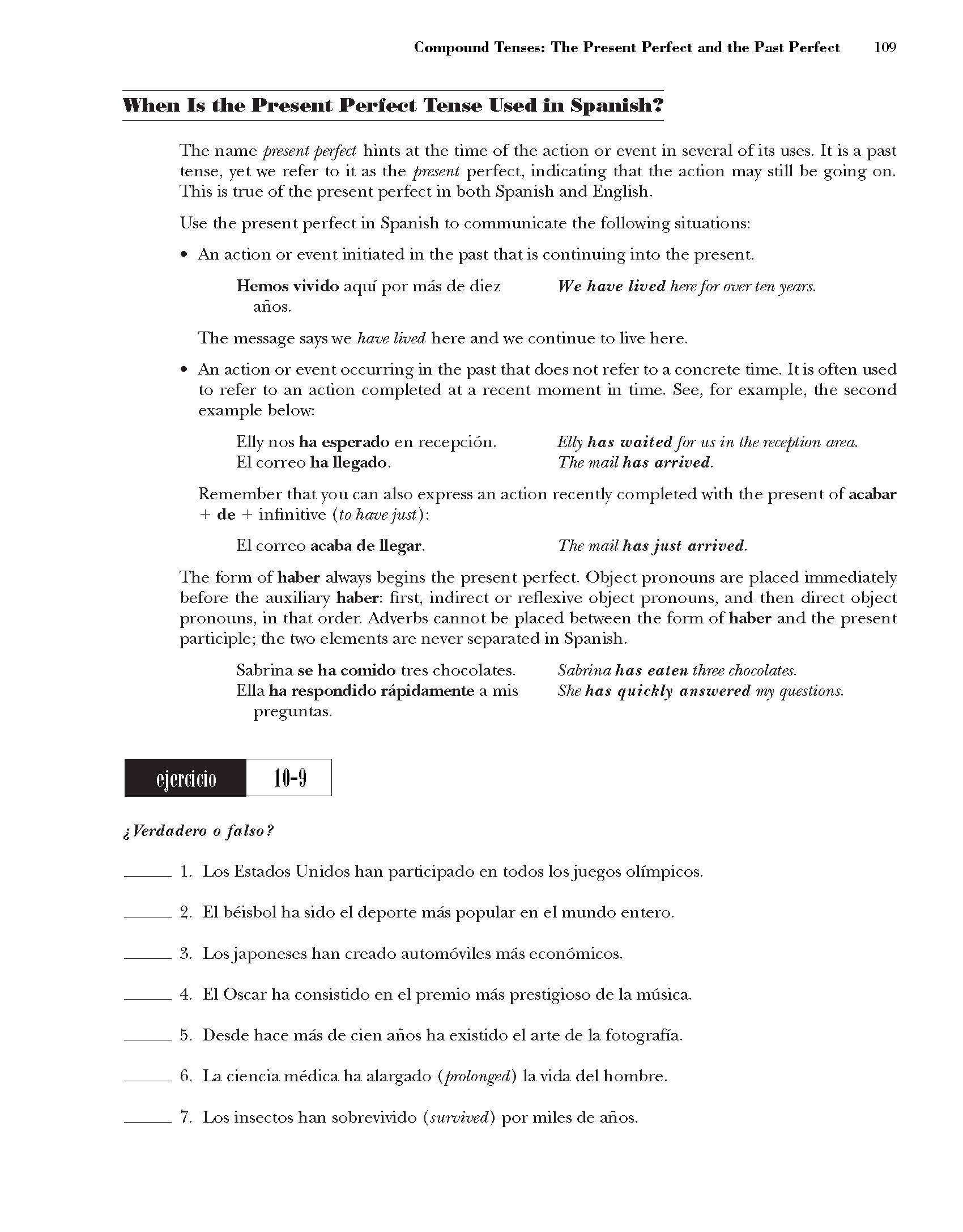CSG120

Compound Tenses: The Present Perfect and the Past Perfect 109
Wlieii Is the Present Perfect Tense I seil in Spanish?
The name present perfect hints at the time of the action or event in several of its uses. It is a past tense, yet we refer to it as the present perfect, indicating that the action may still be going on. This is true of the present perfect in both Spanish and English.
Use the present perfect in Spanish to communicate the following situations:
• An action or event initiated in the past that is continuing into the present.
Hemos vivido aqui por mas de diez We have lived here for over ten years.
ańos.
The message says we have lived here and we continue to live here.
• An action or event occurring in the past that does not refer to a concrete time. It is often used to refer to an action completed at a recent moment in time. See, for example, the second example below:
Elly nos ha esperado en recepción. EUy has waited for us in the reception area.
El correo ha llegado. The mail has arrived.
Remember that you can also express an action recently completed with the present of acabar + de + infinitive (to hcwejust):
El correo acaba de llegar. The mail has just arrived.
The form of haber always begins the present perfect. Object pronouns are placed immediately before the auxiliary haber: first, indirect or reflexive object pronouns, and then direct object pronouns, in that order. Adverbs cannot be placed between the form of haber and the present participle; the two elements are never separated in Spanish.
Sabrina se ha comido tres chocolates. Sabńna has eaten three chocolates.
Ella ha respondido rapidamente a mis She has ąuickly answered my ąuestions. preguntas.
ejercicio
l Yerdadero o falso ?
_ 1. Los Estados Unidos han participado en todos losjuegos olfmpicos.
_ 2. El beisbol ha sido el deporte mas popular en el mundo en tero.
_ 3. Los japoneses han creado automóviles mas económicos.
_ 4. El Oscar ha consistido en el premio mas prestigioso de la musica.
_ 5. Desde hace mas de cień ańos ha existido el arte de la fotografia.
_ 6. La ciencia medica ha alargado (prolonged) la vida del hombre.
_ 7. Los insectos han sobrevivido (survived) por miles de ańos.
Wyszukiwarka
Podobne podstrony:
CSG116 Compound Tenses: The Present Perfect and the Past Perfect 105 yo he nosotros/n oso
CSG118 107 Compound Tenses: The Present Perfect and the Past Perfect • Irregular past participles in
CSG122 Compound Tenses: The Present Perfect and the Past Perfect 111ejercicio10-11 Practica. Usa el
CSG124 Compound Tenses: The Present Perfect and the Past Perfect 113 10-16ejercicio Sorpresas en una
CSG132 121 Compound Tenses: The Futurę Perfect and the Conditional Perfect 6. Habr
CSG134 123 Compound Tenses: The Futurę Perfect and the Conditional PerfectOne Morę Use of the Condit
CSG128 Compound Tenses: The Futurę Perfect and the Conditional Perfect 117 11-3 ejercicio La duda. E
więcej podobnych podstron